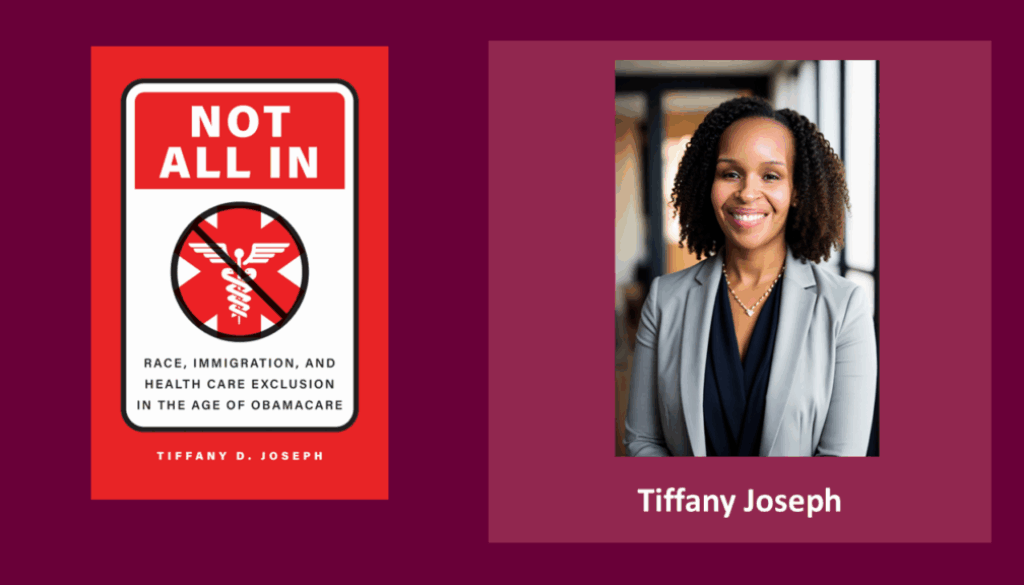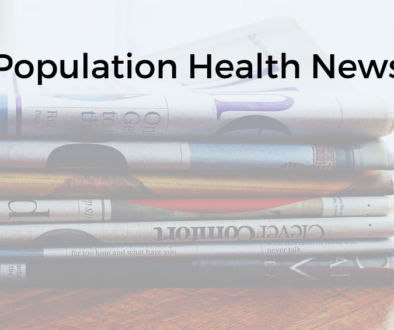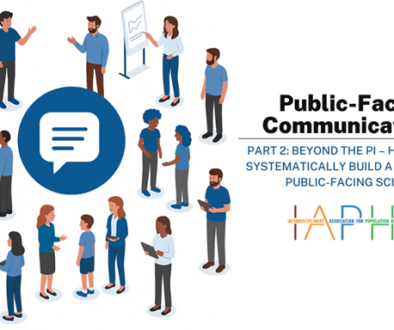Immigrant Healthcare Exclusion: An Interview with Author and Researcher Dr. Tiffany Joseph
Claire Altman
We are delighted to highlight a recent Q&A with Dr. Tiffany Joseph, a former IAPHS member of the month, about her recent book, Not All In: Race, Immigration, and Healthcare Exclusion in the Age of Obamacare (To purchase: JHUP Press (discount code HNAI25) | Amazon).
Note that zoom ai transcripts were used in part to produce this post.
How did you get interested in this project?
Dr. Joseph: My research on healthcare access for immigrants began during my dissertation research in Brazil, nearly 20 years ago. That project was not initially focused on issues around health or health care access, but it came up over and again in interviews. My interest in immigrants’ experience with the US health care system led me to a postdoctoral project at Harvard focusing on the intersection of immigration status and healthcare access in Massachusetts. The research evolved into a book project exploring how policy changes, including the Affordable Care Act, affected immigrants’ healthcare access.
How is increased ICE activity affecting the health and well-being of the communities you discuss in the book?
Dr. Joseph: ICE activity has increasingly focused on immigrant communities. This increased enforcement was noticeable during the 2012 to 2019 observation period for my recent book. Even though enforcement has noticeably increased in recent years, I observed the presence of ICE from the start of my project in 2012 and its impact on immigrants’ healthcare decisions. I noted that ICE enforcement led respondents to report avoiding or canceling medical appointments, refusing to apply for health coverage, and chilling effects on families, even among naturalized citizens and green card holders. One a tragic example involved a Brazilian family who refused to call an ambulance for their sick child due to ICE-related fears, resulting in the child’s death.
How will Medicaid cuts impact these communities?
Dr. Joseph: In my recent book, I discuss the potential impact of Medicaid cuts on communities, particularly in the Boston area, highlighting significant effects on immigrant populations and naturalized citizens. While certain immigrants qualify for Medicaid under specific criteria, cuts could risk coverage for both immigrants and U.S. citizens who gained access under the Affordable Care Act. My research also emphasizes the broader implications for long-term care, as Medicaid funding supports a substantial portion of nursing home care for both immigrants and U.S. citizens, suggesting that these cuts would be detrimental across various groups.
If ACA subsidies expire, how will the Massachusetts system be affected?
Dr. Joseph: The expiration of Affordable Care Act subsidies and tax credits would significantly impact Massachusetts, particularly affecting immigrant communities. During my 2019 research when President Trump and GOP legislators unsuccessfully attempted to repeal Obamacare, stakeholders I interviewed expressed concern about losing federal funds that supported Medicaid expansion and other healthcare initiatives. These federal cuts could lead to difficult decisions for the state and potentially reduce access to healthcare for both citizens and immigrants, as state-funded programs like the Health Safety Net might face funding challenges.
In your book, you explore the complexities of policy implementation, what is the role of population health scientists in this area of research and/or policy?
Dr. Joseph: I want to emphasize the importance of public engagement, for population health scientists to communicate the significance of their research, particularly regarding robust data collection and policy impacts. There is an urgent need to disseminate accurate information to counter misinformation, especially in areas like immigration, and I suggest focusing on subnational levels of government for policy influence. There is an important role for public outreach, including talks, podcasts, and professional associations in advocating for accurate research findings and influencing policy decisions.
What else do you want IAPHS to know about this timely and critical project?
My book explores racialized legal status, highlighting how race, ethnicity, and documentation status intersect to shape immigrants’ experiences in healthcare and broader society. My research with Brazilian, Dominican, and Salvadoran immigrants demonstrates the need for an intersectional approach to understand how both documentation status and racialization impact access to healthcare and daily life experiences. Each of these groups was differentially racialized, shaping their access to health care and their experience with the health care system. This intersectional approach underscores immigrants’ experience of structural racism in their daily lives, that functions at the macro, meso, and micro levels with serious health and healthcare implications.






All comments will be reviewed and posted if substantive and of general interest to IAPHS readers.